ARTISTIC COUNSIL
Miki Manojlovic - Serbia
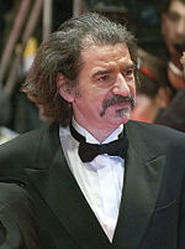
Predrag "Miki" Manojlović (born April 5, 1950, Belgrade)
is a Serbian
actor, famous for his
starring roles in some of the most important films of former Yugoslav cinema.
Since the early 1990s, he successfully branched out into movies made outside
the Balkans, meaning that he's currently active in productions all over Europe. At February 2009 the Serbian Government established him as a
president of the Serbian Film Center.
He grew up in a family of stage actors - father Ivan Manojlović and mother Zorka Doknić. After his screen debut in 1970, young Predrag continued to appear in numerous films and TV dramas made in SFR Yugoslavia, some of which, like the 1975 TV series Grlom u jagode where he memorably played Miki Rubiroza, achieved cult status.
He is arguably best known for the role of the father in Emir Kusturica's 1985 film When Father Was Away on Business and as a tragic opportunist in 1995's Underground (also by Kusturica). He is known for his versatility which helped him make a strong impression both in starring and character roles, as well as dramas and comedies, with his small role in the 1992 hit comedy Mi nismo anđeli being an example of the latter. He played the role of Agostino Tassi in the 1997 film Artemisia and that of Miki in Irina Palm. During the NATO bombardments in 1999, Miki said: "Westerners must understand that no one can constraint anybody, that the Balkans need to live their own life with their own multiplicity of cultures, religions, languages. They must understand that they should not worsen the situation with their own frustrations and their ideas which do not function, that the more bombs will fall in Yugoslavia, the less safety will there be in Europe."
He grew up in a family of stage actors - father Ivan Manojlović and mother Zorka Doknić. After his screen debut in 1970, young Predrag continued to appear in numerous films and TV dramas made in SFR Yugoslavia, some of which, like the 1975 TV series Grlom u jagode where he memorably played Miki Rubiroza, achieved cult status.
He is arguably best known for the role of the father in Emir Kusturica's 1985 film When Father Was Away on Business and as a tragic opportunist in 1995's Underground (also by Kusturica). He is known for his versatility which helped him make a strong impression both in starring and character roles, as well as dramas and comedies, with his small role in the 1992 hit comedy Mi nismo anđeli being an example of the latter. He played the role of Agostino Tassi in the 1997 film Artemisia and that of Miki in Irina Palm. During the NATO bombardments in 1999, Miki said: "Westerners must understand that no one can constraint anybody, that the Balkans need to live their own life with their own multiplicity of cultures, religions, languages. They must understand that they should not worsen the situation with their own frustrations and their ideas which do not function, that the more bombs will fall in Yugoslavia, the less safety will there be in Europe."
Saida Mustajbegović - Bosnia and Herzegovina

Saida Mustajbegović was born on October 10, 1976 in Prijepolje (Serbia), Yugoslavia. She is a writer, poet, director and sociologist from Bosnia and Herzegovina. Her academic education took place in Sarajevo, where she studied Sociology at the Faculty of Political Science, Comparative Literature at the Faculty of Philosophy, and Journalism with the French-Bosnian Media Plan School/Ecole Superieure de journalisme Lille. The combination of these fields is clearly reflected in the variety of her creative output, which includes literary and scientific works, screenplays and documentary films.
Her first book of fiction, The House Without a Roof, the poetry collection Unworn Dreams and the biography Ani Radošević: The Poetess of the Movement represent only a fraction of her numerous literary publications. Her work in the film industry explores a wide spectrum of topics, including transgenerational trauma and narratives reflected in the cultural patterns of the Balkans. Her first documentary film Colours and Rhythms of Unrest provides an insight into the engaged art between the two world wars, as well as its influence and relevance in today’s context.
She is the recipient of multiple awards for her contribution to literature and film, and her work is deeply rooted in the research on the identity and history of the Balkans. She resides in Sarajevo, where she continues to work as a researcher, writer and filmmaker, enriching the regional cultural landscape with her work and vision.
Her first book of fiction, The House Without a Roof, the poetry collection Unworn Dreams and the biography Ani Radošević: The Poetess of the Movement represent only a fraction of her numerous literary publications. Her work in the film industry explores a wide spectrum of topics, including transgenerational trauma and narratives reflected in the cultural patterns of the Balkans. Her first documentary film Colours and Rhythms of Unrest provides an insight into the engaged art between the two world wars, as well as its influence and relevance in today’s context.
She is the recipient of multiple awards for her contribution to literature and film, and her work is deeply rooted in the research on the identity and history of the Balkans. She resides in Sarajevo, where she continues to work as a researcher, writer and filmmaker, enriching the regional cultural landscape with her work and vision.
Nikolay Stoyanov - Bulgaria
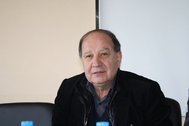
Nikolay Stoyanov was born in 1948 in the town of Karlovo, Bulgaria. He completed a course in oriental studies and graduated Bulgarian philology, then specialized in France. He worked for the Literary Section of the Bulgarian National Radio, for the National Feature Film Studio, as a publisher of the oldest Bulgarian literary journal “Plamak”(founded more than eighty years ago) which published the most poignant and critical works before the political change in Bulgaria. He was the first Editor in Chief of the Bulgarian edition of the highly respected French newspaper “Le Monde Diplomatique”. He is the author of more than fifteen works of fiction including the short story and novella collections “One in a Million”, “Night Relationship”, “Chronicles of the Neighborhood”, “Book without Covers”, “Transit Visa”, “The French Chamber”, and “Autumn Novellas”; the novel “Murder Workshop”, and the collection of essays “Pantheon at the Foot of the Balkan”. Nikolay Stoyanov has written the scripts of four successful feature films broadcast by the National Bulgarian Television. He has written several radio plays. Nikolay Stoyanov has translated from the French works by Patrick Modiano, Francoise Sagan, Georges-Olivier Chateaureynaud. He has won the most prestigious Bulgarian literature prize - the Ivan Vazov Award, the European Award for Poetic Prose, and in 2005, he was awarded “Paris Europe” prize by the municipality of Paris and by the European Union for his contribution to the culture of United Europe. He is the founder and President of BALKANICA International Foundation that annually awards the Balkan literary prize of the same name.
Dimitris Kerkinos - Greece
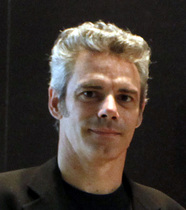
Dimitris Kerkinos (born August 9th, 1963) studied Film Studies at the University of Manitoba, Canada. He did his Ph.D. dissertation on “Society and Cinema in Cuba of the 90s” for the Department of Social Anthropology and History at the University of the Aegean, Greece. He jointed the Thessaloniki IFF in 1999, and since 2002 he is programming the Balkan Survey Section. He has curated retrospectives and tributes to directors and national cinemas for TIFF and TDF (Thessaloniki Documentary Festival) and has also advised and programmed tributes to Greek cinema for KVIFF, Transylvania IFF, T-Mobile New Horizons IFF. He has published essays on cinema and anthropology and has edited many documentary and fiction film monographs for TIFF and TDF (i.e. Carol Reed, Goran Paskaljević, Cristian Mungiu, Patricio Guzmán, Peter Wintonick). He lectured Visual Anthropology and Ethnographic Documentary at Panteion University in Athens (2004-2008).
Karpo Godina - Slovenia
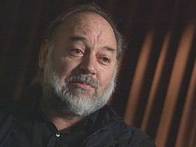
Karpo Ačimović Godina (born 26 June 1943) is a Slovenian cinematographer and film director. He is one of the most important representatives of the Yugoslav cinematic movement "Black Wave", which produced numerous socio-critical films between 1964 and 1973. His film Artificial Paradise was screened out of competition at the 1990 Cannes Film Festival. Selected filmography: Occupation in 26 Pictures (1978), Artificial Paradise (1990).
Bashkim Shehu - Albania
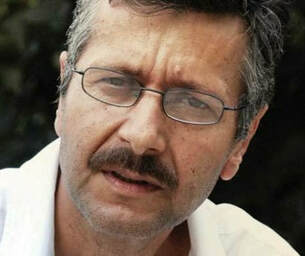
Born in Tirana in 1955, a graduate of Albanian Literature and Language at the University of Tirana in 1979, fluent in many languages (French, English, Italian, Spanish, and Catalan) from which he translates into his own language, Bashkim Shehu is above all a fiction writer. Author of a dozen novels and many collections of short stories, his writings are translated into different languages from English, French, Spanish, German to even Rumanian and Serbian.
From a very young age, Bashkim Shehu dedicated himself to literature. On the other hand, he had the occasion to experience in his own flesh the extremes of a totalitarian system in which he was born and raised. Son of one of the most important members of the system's top leadership, purged by the dictator in 1981, he spent eight years in what is known as the “Albanian Gulag”, sentenced twice for what was considered a crime of opinion. He was released with the collapse of the dictatorship in 1991.
Bashkim Shehu moved to Barcelona in 1997 thanks to the program Asylum Cities of the International Parliament of Writers and he was representative of this association in this city from 1998 to 2000. Since then he has served as adviser of the general director of the Centre de Cultura Contemporània de Barcelona (CCCB), from 2001 to 2011, and has continued his work as a literary writer and translator. Some of the authors he has translated into Albanian are: George Steiner, Hannah Arendt, Søren Kierkegaard, Roberto Bolaño (2666), Gabriel García Márquez, Ernesto Sábato, Javier Cercas, Javier Marías, Eduardo Mendoza, Jaume Cabré, J. G. Ballard, Eric Hobsbawn, Alain Finkielkraut, Zygmunt Bauman and many more.
From a very young age, Bashkim Shehu dedicated himself to literature. On the other hand, he had the occasion to experience in his own flesh the extremes of a totalitarian system in which he was born and raised. Son of one of the most important members of the system's top leadership, purged by the dictator in 1981, he spent eight years in what is known as the “Albanian Gulag”, sentenced twice for what was considered a crime of opinion. He was released with the collapse of the dictatorship in 1991.
Bashkim Shehu moved to Barcelona in 1997 thanks to the program Asylum Cities of the International Parliament of Writers and he was representative of this association in this city from 1998 to 2000. Since then he has served as adviser of the general director of the Centre de Cultura Contemporània de Barcelona (CCCB), from 2001 to 2011, and has continued his work as a literary writer and translator. Some of the authors he has translated into Albanian are: George Steiner, Hannah Arendt, Søren Kierkegaard, Roberto Bolaño (2666), Gabriel García Márquez, Ernesto Sábato, Javier Cercas, Javier Marías, Eduardo Mendoza, Jaume Cabré, J. G. Ballard, Eric Hobsbawn, Alain Finkielkraut, Zygmunt Bauman and many more.
Bulent Kucukerdogan - Turkey
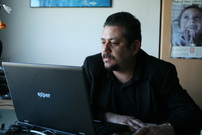
After taking a degree in Literature at Istanbul University, he graduated
and got his PhD at Institute of Social Sciences, Istanbul, Department of
Radio-Television and Cinema. Author of several books and many important
articles and papers delivered in international symposiums, he is an honourable
member of the globally most known scientific foundation and associations, and
the Vice Coordinator of CILECT SEECS – South East European Cinema Schools
Association. As a Specialist in video and film editing, he is respected advisor
and editing supervisor of a number of short, documentary and feature films in
Balkan region and jury member of the regional film festivals.
Eugen Serbanescu - Romania
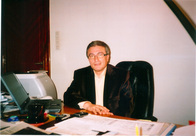
Eugen Serbanescu is the General
Manager of the Romanian National Cinematography Center. He graduated Aerospace
Engineering at the Polytechnic University of Bucharest, Mastering at the
English Language Program of the University of Bucharest and taking his Ph. D in
Aerodynamics also in Bucharest, in 1987. He has worked as Aeronautical Engineer
and Scientific Researcher from 1980-89. Since then he’s held various positions
in Romania Libera (from Editor to
Chief of the Domestic Policy Department, to Deputy Editor-in-Chief. Furthermore
he has worked as a Media Relations Consultant for the UNDP, Spokesman for the Government of Romania and Secretary of State, Head of the Press Department, Consul General of
Romania in Los Angeles, Consul General of Romania in New York and various other
working positions. He has numerous publications, conference papers, novels and
film scripts. His extraordinary rich experience also includes participation in
both round table and individual interviews on TVR, PRO-TV, PRIMA - TV, Realitatea TV, Radio Romania, Radio Free Europe, Voice of America,
Washington, D.C., BBC Radio, Radio Contact, Radio Tinerama and being moderator
at "Front Line," a weekly political talk show on Tele7 abc, 1994-1996.

